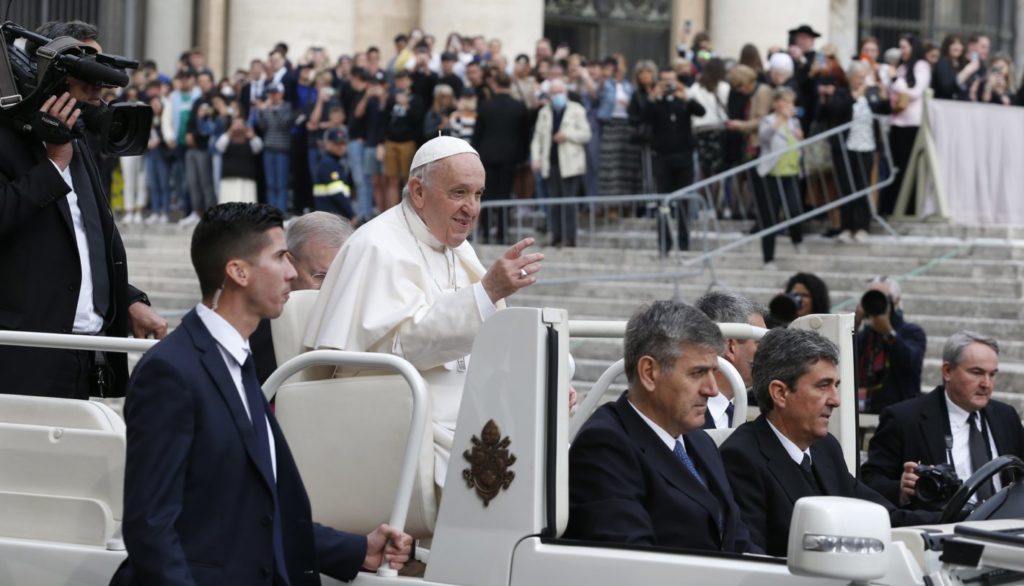 Pope Francis: "I would go to Putin if he would open the door... we must stop the fire of weapons".
Pope Francis: "I would go to Putin if he would open the door... we must stop the fire of weapons". "May young people be open to gratitude for what they have received."
"May young people be open to gratitude for what they have received."As we enter the month of May, Pope Francis' General Audience on Wednesday, May 4, in St. Peter's Square, focused on the biblical figure of Eleazar and the honor of the faith: "On the path of catechesis on old age, today we meet a biblical figure named Eleazar, who lived during the time of the persecution of Antiochus Epiphanes. His figure gives us a testimony of the special relationship that exists between the fidelity of old age and the honor of faith. I would like to speak precisely of the honor of the faith, not only of the coherence, of the proclamation, of the endurance of the faith. The honor of faith is periodically under pressure, even violent pressure, from the culture of the dominators, who try to debase it by treating it as an archaeological find, an old superstition, an anachronistic stubbornness".
"The biblical story," the Pope continues, referring to the story of Eleazar, "narrates the episode of the Jews forced by a decree of the king to eat meat sacrificed to idols. When it was the turn of Eleazar, who was an old man highly esteemed by all, the king's officials advised him to make a simulation, that is, to pretend to eat the meat without actually doing so. In this way Eleazar would have been saved, and - they said - in the name of friendship he would have accepted their gesture of compassion and affection. After all - they insisted - it was a minimal, insignificant gesture".
Francis emphasizes this point, consistency with the faith is fundamental: "The calm and firm response of Eleazar is based on an argument that strikes us. The central point is this: dishonoring the faith in old age, in order to gain a few days, is not comparable to the inheritance that it must leave to the young, for generations to come. An old man who has lived in the coherence of his own faith all his life, and now adapts himself to pretend to repudiate it, condemns the new generation to think that the whole faith has been a fiction, an outer covering that can be abandoned thinking that it can be preserved in one's own intimacy. Not so, says Eleazar. Such behavior does not honor faith, nor does it honor God. And the effect of this external trivialization will be devastating for the interiority of young people".
"It is precisely old age that appears here as the decisive and irreplaceable place of this witness. An old person who, because of his vulnerability, agrees to consider the practice of faith irrelevant, would make young people believe that faith has no real relationship with life. It would appear to them, from the beginning, as a set of behaviors that, if necessary, can be simulated or disguised, because none of them is so important for life".
Pope Francis alluded to "the ancient heterodox gnosis," which "theorized precisely this: that faith is a spirituality, not a practice; a force of the mind, not a way of life. Faithfulness and honor of the faith, according to this heresy, have nothing to do with the behaviors of life, the institutions of the community, the symbols of the body. The seduction of this perspective is strong, because it interprets, in its own way, an indisputable truth: that faith can never be reduced to a set of dietary norms or social practices. The problem is that the Gnostic radicalization of this truth nullifies the realism of Christian faith, which must always pass through the incarnation. And it also empties its witness, which shows the concrete signs of God in the life of the community and resists the perversions of the mind through the gestures of the body".
Therefore, he affirmed that "the Gnostic temptation always remains current. In many trends in our society and culture, the practice of faith suffers a negative representation, sometimes in the form of cultural irony, sometimes with a hidden marginalization. The practice of faith is seen as a useless and even harmful externality, as an antiquated residue, as a masked superstition. In short, a thing for old people. The pressure that this indiscriminate criticism exerts on the younger generation is strong. True, we know that the practice of faith can become a soulless externality. But in itself it is not at all. Perhaps it is up to us elders to restore to the faith its honor. The practice of faith is not the symbol of our weakness, but rather the sign of its strength. We are no longer children-we are not joking when we set out on the Lord's path!"
The Holy Father concludes by saying that "faith deserves respect and honor: it has changed our lives, it has purified our minds, it has taught us to adore God and love our neighbor. It is a blessing for everyone! We will not trade faith for a few quiet days. We will demonstrate, with much humility and firmness, precisely in our old age, that believing is not something "for old people". And the Holy Spirit, who makes all things new, will gladly help us".











